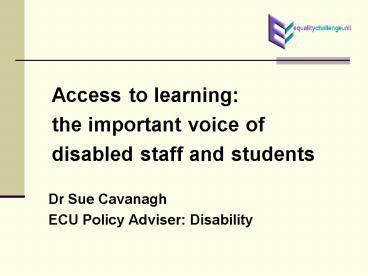Access to learning: - PowerPoint PPT Presentation
1 / 16
Title:
Access to learning:
Description:
The Disability Discrimination Act 2005 has placed a specific duty on higher ... occur at key stages of the development of plans and services (DRC Code Chapter 3) ... – PowerPoint PPT presentation
Number of Views:45
Avg rating:3.0/5.0
Title: Access to learning:
1
- Access to learning
- the important voice of
- disabled staff and students
- Dr Sue Cavanagh
- ECU Policy Adviser Disability
2
DDA Specific duties
- The Disability Discrimination Act 2005 has placed
a specific duty on higher education institutions
to involve disabled staff and students in
reviewing its policies and practices, to ensure
they are not discriminatory and to anticipate
requirements.
3
DDA Specific duties
- This obligation extends to teaching and learning
policies and practices. Particularly through the
requirement to involve disabled people in impact
assessment of existing and proposed curricula and
course programmes. - This duty therefore needs to be understood by
academic staff and course developers.
4
DDA Specific duties
- The principles behind the Disability Equality
Duty are based on the social model of disability.
- This recognises that it is often not the
impairments or conditions experienced by
individuals that prevent them succeeding in their
chosen path, but the unnecessary barriers that
have been constructed and embedded, often
unintentionally, within institutions and wider
society. - These barriers can be physical or attitudinal,
but if left unchallenged they can perpetuate
institutional discrimination and social
exclusion.
5
DED and academic staff responsibilities
- Review practices and adopt an inclusive teaching,
learning and assessment approach - Ensure they have had appropriate training to make
their practices more accessible - Ensure they understand their duties to make
reasonable adjustments and anticipate need - Ensure that they are aware of the advice and
support services available for disabled students
6
Benefits of disabled staff and student involvement
- Disabled staff and students can help academic
staff eliminate discriminatory practices by - Identifying the barriers to participation,
achievement and success formal policies and
informal practices - Identifying ways that things could be done more
inclusively and that will promote disability
equality - Giving feedback on priorities for change to
enable more effective planning
7
Barriers to involvement
- Evidence from the ECU DES progress survey and
feedback service suggests that genuine
involvement of disabled staff and students is not
taking place satisfactorily in many institutions. - Lack of awareness about the responsibility of the
whole institution and of all staff to end
unjustified discriminatory practice
8
Barriers to involvement
- Lack of commitment to provide adequate training
and resources to bring about better understanding
and positive change - Lack of understanding of the difference between
consultation and involvement - Under declaration of disability status from both
staff and students
9
Overcoming the barriers lack of awareness and
commitment
- Access support and information from disability
teams at the ECU, HEA and AonA workshops,
publications - Bring in trainers and consultants or use in-house
resources to raise awareness levels throughout - Utilise internal and external champions to help
make the case - Seek out examples of good practice from other
institutions and adapt these
10
Overcoming the barriers involvement v
consultation
Involvement is an active process that should
occur at key stages of the development of plans
and services (DRC Code Chapter 3). It does not
have to happen throughout. e.g. impact
assessment of new course proposals would be an
example of a key stage. But informal practices
also need to be considered eg through
satisfaction surveys
11
Overcoming the barriers involvement v
consultation
- Involvement is stronger than consultation and
should enable key decision-making and change
to be influenced so that it is not a token
exercise - Involvement should include the full diversity
of disabled people both in terms of impairments
and other aspects of identity- race, gender etc.
12
Overcoming the barriersunder declaration
How can an institution involve disabled staff and
students, if does not know who they are or if
they are willing to get involved?
13
Overcoming the barriersunder declaration
HEFCE Statistics 2003- 4 (declared impairment or
long term health condition) Students 4.8 of
first year students 845,000 60 unseen
such as mental health Staff 2.3 out of
270,000 employed People of working age in UK
19 (7 million) OFNS Labour Force Survey 2005
14
Overcoming the barriersunder declaration
- May involve culture change so that staff and
students feel confident that they will not be
discriminated against and see purpose of
involvement - Not just an HEI problem, but HEI can lead the way
- Disabled staff and employees have rights but 52
of those protected by the DDA do not perceive
themselves to be disabled - Many impairments and conditions are unseen but if
not disclosed not protected by DDA
15
Overcoming the barriersunder declaration
- ECU programme of action for 2007 aims to support
action to increase staff disclosure. Not just
important to feed into involvement process, but
as a powerful indicator of culture change. - ECU wants to work with regional EO networks to
support setting up virtual forums for disabled
staff to address the issue of under disclosure
and to provide mutual support - Unison is currently piloting a scheme of
developing disabled staff networks in FE which
ECU will repeat in HE if successful
16
ECU publications
- Involving Disabled People in Disability Equality
Schemes - Disability Legislation Practical Guidance for
Academic Staff (ECU/HEA) - http//www.ecu.ac.uk/publications/guidance
publications/ - Towards Disability Equality using statistics and
data categories for monitoring - http//www.ecu.ac.uk/publications/updates/
- DEP bulletin
- www.ecu.ac.uk































